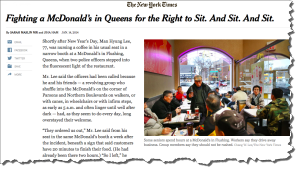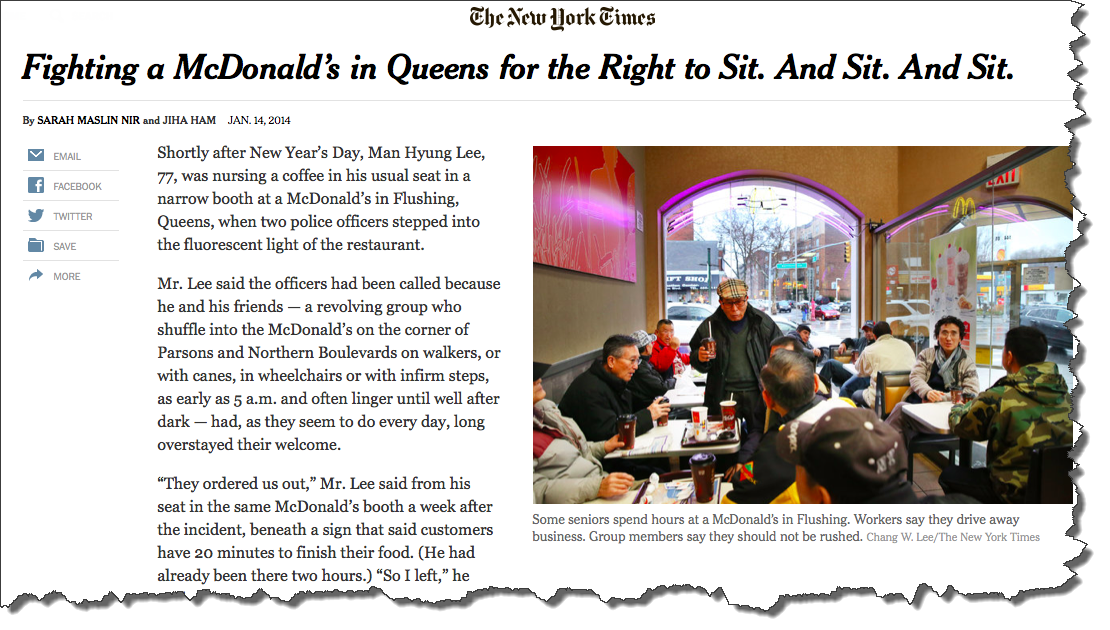 In Flushing, Queens, McDonald’s employees have been battling the presence of a revolving group of elderly Koreans who sometimes sit at the fast food chain’s tables from dawn to dusk. In the past few months, police have been called in a handful of times to usher the seniors out. The seniors then defiantly walk around the block and plop themselves back on McDonald’s benches minutes later.
In Flushing, Queens, McDonald’s employees have been battling the presence of a revolving group of elderly Koreans who sometimes sit at the fast food chain’s tables from dawn to dusk. In the past few months, police have been called in a handful of times to usher the seniors out. The seniors then defiantly walk around the block and plop themselves back on McDonald’s benches minutes later.
According to the New York Times piece:
And though they have treated the corner restaurant as their own personal meeting place for more than five years, they say, the situation has escalated in recent months. The police said there had been four 911 calls since November requesting the removal of the entrenched older patrons. Officers have stopped in as frequently as three times a day while on patrol, according to the patrons, who sidle away only to boomerang right back. Medium cups of coffee ($1.09 each) have been spilled; harsh words have been exchanged. And still — proud, defiant and stuck in their ways — they file in each morning, staging a de facto sit-in amid the McNuggets.
There are a number of senior and civic centers in the surrounding area and there are even other Burger Kings and McDonald’s in the vicinity, but none hold the draw of this particular McDonald’s. So why there?
It’s certainly not the McRib. Seniors don’t always want to be associated with groups labeling them as elderly or somehow in need, which might explain the preference for a fast food chain to the Korean Community Center in Flushing. Over the years, it’s easy to imagine they’ve developed a comfort with the space, entirely public and non-assuming about any type of identity (and dare I add even a sense of ownership). At the end (and beginning and middle) of the day, it’s the draw of community – of a place to chat, be it gossip or hometown politics, and of a place where people know you. Particularly for those living alone or who feel isolated, the social space serves an important function, not the least of which is mental well-being and a reason to get out of the house.
And having purchased something, even if only a large cup of coffee, they feel they should be allowed to sit at their leisure. It’s straightforward: You pay and you get to sit and see people you know. The question that’s being raised is for how long? Few, certainly not the company’s management, think about Mickey D’s as a central hangout space without time limits, so their frustration over all-day occupants is understandable from a business standpoint. This group seems to be stretching beyond even how long the most tolerant coffee shop will allow its laptop-bearing patrons to sit. At the same time, I wonder why now it’s becoming an issue where this seems to be a long-standing phenomenon. And the Flushing seniors, meanwhile, seem determined to take a stand: one man stated that he would not budge next time police showed up, while another insisted he would listen dutifully, but return promptly after their departure.
In my neighborhood of upper upper Manhattan, largely made-up of Dominican and Puerto Rican residents, I see a similar thing. Though I couldn’t tell you if anyone there stayed through the entire day, the McDonald’s around the block from me certainly is an informal community social space. Customers walking through clearly know many of the others at the booths, asking about each other’s lives and talking story, looking very comfortable in their seats. Certainly taking more than twenty minutes to finish their food as a sign in the Flushing McDonald’s asks of its customers. My first time in there, it felt akin to a cross-section of the neighborhood, one of the unauthorized community bulletin boards. So though I’ve never been to the McD’s in Flushing, I envision the same feel and it’s hard for me not to take the side of the seniors, stubborn as they may be. And though acknowledging that an all-day camp-out of rotating Koreans might be pushing the limits of fast food chain etiquette, it’s still hard for me to begrudge them their space.
8Asians writers from other states brought up stories of their own folks frequenting the local McDonald’s or coffee shops as a important parts of their days. I was reminded of my great-aunt and uncle’s multi-hour yum cha outings in Hong Kong where on any given weekday morning the place is chock full of elderly with their newspapers out, occasionally chatting with familiar faces and drinking from a single pot of tea.
A compromise was made at the McDonald’s in question: “the group could sit at the restaurant, in Flushing, for as long as it wanted, except from 11 a.m. to 3 p.m..”
But given that this issue is not exclusive to Flushing, what do you think? Does McDonald’s have the right to be angry? Do the seniors have a right to their seats?








